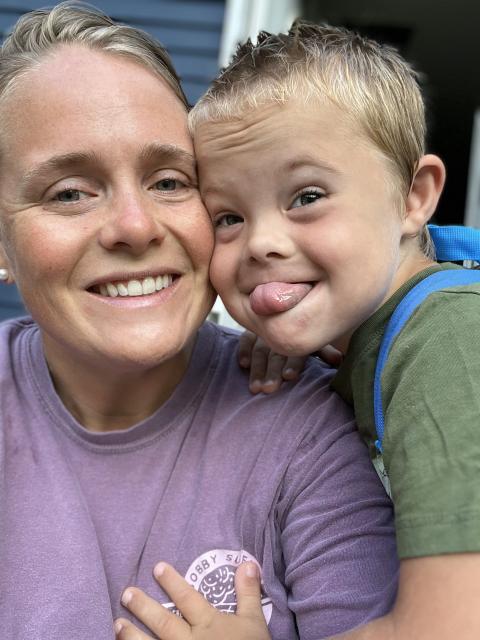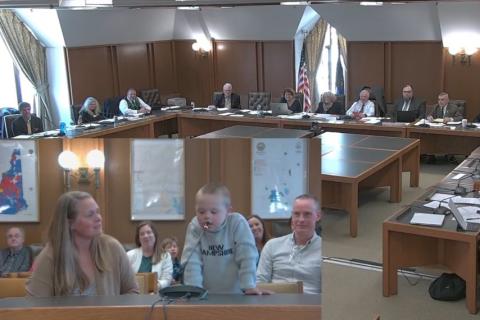LEND Policy Experience Impacts Legislative Change
This month’s Submit a Story entry, written by Meaghan Foster (LEND 2019), illustrates the continuing impact of the LEND Policy experience on our Alums and their ability to go forward to effectively advocate for fair and equitable supports and services for children with developmental disability.
Meaghan’s story:

Meaghan and Zander Foster
In the summer of 2021, when my husband and I enrolled our son Xander in a summer camp, we knew it was important to share with the staff our concerns about some recently emerging behaviors related to his limited communication and our much bigger concern, elopement. The third day of camp, our worst nightmare was realized with a phone call; Xander had been missing for 20 minutes at his lakeside camp.
You see, the week prior, Xander had eloped from our house and was gone for about 15 minutes when we called the police. He was found without injury, close to our home, just not responding to his name. This time, I knew what to do. I immediately called the police and raced to the camp. Thankfully, Xander was found safe and completely happy within the hour.
The alarming incident at camp catapulted my husband and I into researching strategies to prevent elopement. We learned about Applied Behavioral Analysis (ABA), an evidence-based intervention for teaching children positive behaviors and effectively addressing elopement. It became a high priority for me to have these services delivered in our home to address Xander’s behaviors and lack of safety awareness. After finding an organization to provide ABA therapy for Xander, we shortly discovered that Down syndrome was not a qualifying diagnosis for insurance coverage; only autism was. Appealing to the insurance company, I knew to cite peer reviewed research regarding ABA’s effectiveness with individuals with Down Syndrome and cite that every doctor I talked with endorsed its effectiveness. After many calls to local politicians, the decision was reversed for our case and our insurance company approved coverage for Xander’s ABA services. We immediately saw improvements, but worried with every reauthorization that coverage would be lost.
My journey continued. Through my research, I found existing legislation stating that ABA needed to be covered for individuals with a diagnosis. It seemed simple; what if we just added Down syndrome to that legislation?
Drawing from my LEND experience, I knew that New Hampshire was a good place to make grassroots change. Our politicians are approachable and care to hear from their constituents. So, I talked with local politicians and made a connection with Gateway Community Service’s Legislative Liaison, who I learned was already working on this exact issue. Together we worked to find a sponsoring senator, put together testimony, and we presented SB 353 to the Health and Human Services Committee. The senate passed the bill and it sailed through the Finance Committee. Unfortunately, the Commerce and Consumer Affairs Committee put SB 353 to interim study and will likely not pass this time round. My hope is to continue the work with legislators, build evidence regarding the benefit of ABA services for children with Down Syndrome, overcome opposition from insurance companies, and hopefully have the bill brought up again in the fall.
Thank you LEND for the knowledge and confidence to advocate and affect policy change that will improve the lives of children with different abilities, no matter what their diagnosis.

Meaghan Foster and her son Zander testifying to the Health and Human Services Committee in April 2024.